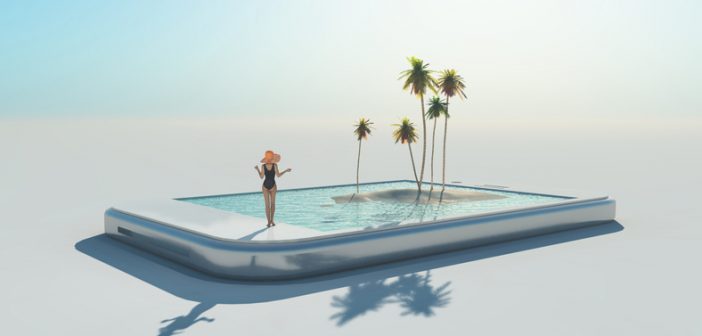The sharing economy comes from big cities to the coastal areas to make tourism more comfortable and efficient. Controlling the amount of sun your skin absorbs or booking a boat with a driver from your mobile phone in a matter of minutes are just some of the possibilities available from digital platforms.
Almost 40% of Spaniards opt for sun and beach destinations as their first option when travelling, according to the June 2018 CIS (Spanish Centre for Sociological Research) barometer. So, when the good weather arrives, towns and cities up and down the coast want to make the most of the influx of visitors and tourists and offer attractive services and products for those seeking relaxation, leisure and entertainment. Sharing economy services also increase along the coast during the summer months, adapting their business model and offer to the high demand. The coast is now becoming a key location to develop digital businesses and activities.
Experts from The Valley tell us what are the latest trends and innovative technology on the coast this summer.
∙ Having a private boat with a captain on the spot is now possible
We’re now seeing more and more shared hybrid bicycles, electric scooters and cars in the big cities that can be reserved via a mobile application. And many of these cutting-edge trends have reached the coast making mobility easier, more efficient and accessible in the most frequently visited spots this summer. There are also platforms operating in coastal areas that allow you to book a taxi-boat by marking the origin and destination on your mobile. Can you imagine? Once again, technology is offering more possibilities to make life easier, this time, with boats available on-demand to take you between islands or points along the coast that are not connected by land.
∙ Book sun loungers and control the solar radiation your skin absorbs from your mobile
New applications let you check if there are sun loungers available in the different beach bars, book and pay for them securely from your mobile without the need for early mornings and running frantically to the beach to secure a good spot. Nowadays, all you need is a smartphone to order food from the nearest beach bar and have it delivered to your spot; check the water conditions and temperature in real-time; and even take care of your health with wearables with a microchip that you stick to your skin to check the solar radiation absorbed, and it then sends a signal to your phone via NFC (Near-field communication). It’s also becoming more frequent to find beaches in Spain offering free Wi-Fi, so that anyone can use these services.
∙ Drones and wearables that act as smart lifeguards on the beach
New disruptive technologies have brought with them a variety of tools and services that provide greater safety on the beach for adults and children, and therefore more peace of mind for everyone. Watching drones flying over the beaches acting as watchmen and lifeguards is already a reality in Spain. The drones fly over the sea using sensors to identify possible complications and carry floats to those affected in the water. The Valencian Institute of Tourism Technology has launched the “Smart Beaches and Natural Spaces” project with the same objective of protecting beachgoers and improving safety and sustainability on the Valencian coast. With a strong focus on the safety of minors, the plan also includes using geolocalised bracelets to reduce the risk of children getting lost; along with other innovative initiatives such as waste management through sensors that provide information on whether containers or litter bins are full, and solutions to improve accessibility with ramps adapted via Bluetooth beacons or acoustic signaling.
∙ Technology now spans sports in the water and relaxation on the sand
Lifelong water activities have also been revolutionised with new technologies. In the world of extreme water sports, activities like surfing that used a traditional board have now evolved into a whole new experience allowing adventure-seekers travel through the air and do flips in the water, thanks to the Flyboard, a type of hovercraft board that works with a propulsion system.
Nowadays, it’s far more common to see children playing with mobiles and tablets than buckets and spades and making sandcastles. In much the same way, waterproof e-books are the new alternative to traditional books that can suffer wear and tear from the sun, sand and beach.






